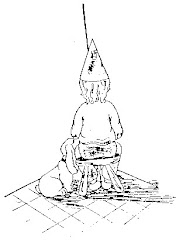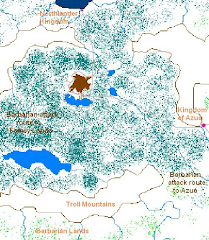This is the first of my posts on the people who are important to Khirhsa, who is the Main Character in my Swords of Fire saga. It is only fitting I begin with Kelso, although Kelso is not, ultimately, the most important person to Khirsha.
I can write a awful lot about Kelso (or is that a lot, awfully?), but I will keep this post short. My first novel hasn't been published and I don't want to reveal too much right now.
Kelso is near cousin to Khirhsa, which means there is a sibling relationship between their parents. In the case of Kelso and Khirhsa it is their fathers. Khaiu (Kelso's father) and Shello (Khirsha's father) are brothers. Much is made in Pawns (a.k.a. Flames of Hatred) how Kelso and Khirsha are like brothers. "Different in appearance, they were very much alike in spirit and had bonded closer than many who were married." (from Pawns)
Kelso was born on *Nelshius in the year 329 to Tura and Khaiu. This was the day which separated the Planting Season from the Growing Season. We would call it the beginning of summer. His birth took place at the Great Hall. Hawnka (another important character in Khirsha's life) acted as mid-wife assistant. Khirsha would be born four years later, at Mid-Summer's Day. Kelso's first sibling, Thaia, would not arrive until 337. Khirsha's first sibling, Kaschira, was not born until 338. Both Thaia and Kaschira would die in the Year of Sickness in 340. That was a notable year for many. It was also the year when Khirsha had his first notable contact with Tavaar, who was to become quite important to him. Shirae and Tursa, Khirsha and Kelso's youngest sisters, would not be born until 342. This lack of siblings brought the boys together as though they were brothers, and it remained that way until death finally separated them.
Kelso was pretty much everything a mother and father could want. He was strong, gifted, handsome, intelligent. The list went on. He is described in Pawns as being "built for strength and endurance. He had dark eyes that looked out mischievously through thick black hair hanging loose to his shoulders". Many girls near his age desired him, but he only allowed a few to get close. Partly, this was out of fear. It was the one area in which Kelso's confidence abandoned him. But mostly it was because, like his father, Kelso was intensely interested in developing his skills with the flamesword, and relationships tended to be distracting. The result was he was seen as the greatest warrior of his generation. Possibly even greater than Shello, who many believed to be the greatest ever.
He was Khirsha's mentor in virtually everything, including girls. In Pawns, it is Kelso who opens Khirsha's eyes to the political subterfuge going on around them. It is Kelso who first concludes the family is at risk of war, and with who. It is Kelso who points out to Khirsha that spying on the flying Cere Princess is hardly an act worthy of love. It is Kelso who encourages Khirsha to speak with Sayla before their friendship is ruined. And it is Kelso who prophetically tells Khirsha he is going to have to make a difficult decision of life and death. This position of importance creates a problem.
The problem with Kelso being so important to Khirhsa, both as a pseudo-brother and a mentor, is that Kelso also becomes Khirsha's crutch. As long as Kelso is around, Khirsha will never achieve his potential. This is proven by the fact that Khirsha always loses to Kelso in everything. (An extremely important point.) When they were very young this was only natural. Kelso was four years Khirsha's senior. But by the time Khirsha was nineteen (his age during Pawns) he should have been been able to win at least some time. That he never did was evidence of Kelso's emotional superiority. The two had to separate in order for Khirsha to grow, and that is, in fact, what happens.
Should Pawns ever become a published work, and should you come to read it, pay close attention to Khirsha's interactions with Kelso. They portend a lot.
* The Great Sea's calendar year was 396 days divided into eight months of 48 days each and 12 days which were not part of any month. Each month had six 8-day weeks. Every week day had its own name, and each day of the year was also uniquely named. The year was structured so that every day had the same name every year. Thus, for someone born on Magday Calesen 3 in the year 340, their birthday in 341, 342, 343 and so forth would remain Magday Calesen 3.







No comments:
Post a Comment